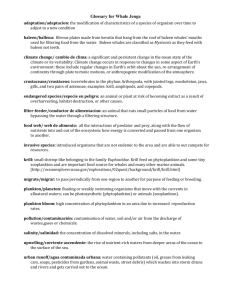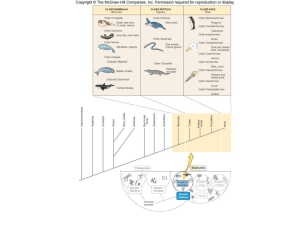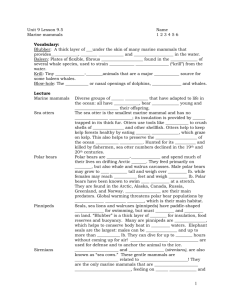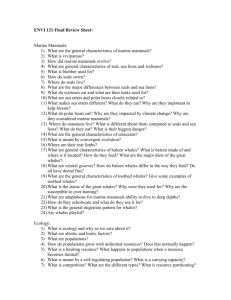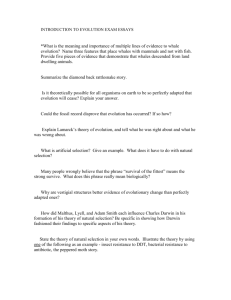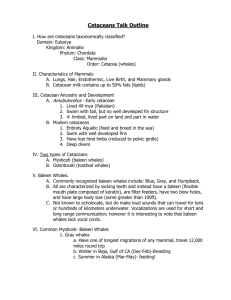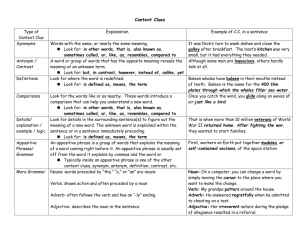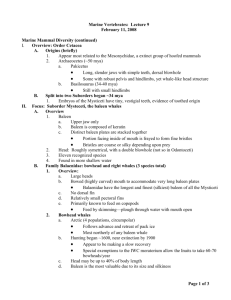Caytonia
advertisement
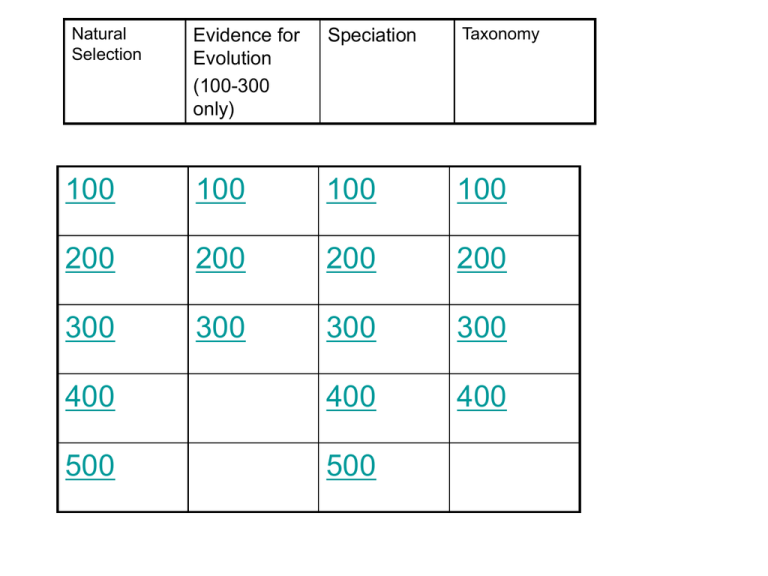
Natural Selection Evidence for Evolution (100-300 only) Speciation Taxonomy 100 100 100 100 200 200 200 200 300 300 300 300 400 400 400 500 500 Evolution 100 Caytonia is an extinct plant that existed between 200 and 140 million years ago. It had reproductive structures that resemble structures in modern flowering plants. How do scientists know about the structures of this extinct plant? a. b. c. d. Scientists study the DNA sequences of Caytonia Scientists genetically engineer modern plants to produce Caytonia Scientists excavate and examine the fossilized remains of Caytonia Scientists observe the adaptations of plants in habitats resembling those of Caytonia Evolution 200 • European rabbits were introduced to Australia in 1859. The rabbits reproduced rapidly in their new habitat, displaced other animals, and overgrazed vegetation. In an attempt to reduce the rabbit population, a virus was introduced in 1951. This virus is usually deadly to European rabbits. When the virus was first introduced, the rabbits died in large numbers, but the death rate decreased over time. Which of the following best explains the decrease in the rabbit death rate? a. b. c. Young rabbits learned to avoid being infected with this virus. Natural selection favored rabbits that are resistant to this virus. The lifespan of this virus is too short to affect rabbits over a long period of time The rabbits that were originally infected with this virus have been dead for many years. d. Evolution 300 In a mouse population inhabiting a grassland area, a mutation occurs that results in a new coat color allele. Which of the following factors has the greatest effect on whether the new coat color will become more common in the mouse population? a. whether abundant food is available in the grassland b. whether the new coat color allele is dominant or recessive c. whether the rate of reproduction in the mouse population is stable d. whether the new coat color allele increases the survival of mice in their environment Evolution 400 Similar structures are present in the embryos of fish, chickens, and rabbits. In fish, these structures develop into gills, but in chickens and rabbits, they either disappear or develop into other body parts later in embryonic development. Which of the statements below best explains the presence of these structures in the embryos of all three species? a. The embryos of the three species are similar in size b. Breathing structures are similar among the young of the three species c. The three species have a common ancestor with these embryonic structures. d. The reproductive mechanisms are similar among the adults of the different species Evolution 500 Fossils show vestigial pelvic bones of some modern day baleen whales and vestigial hind limb bones of many extinct whale species. The presence of these bones in the baleen whale and extinct whale provides evidence of which of the following? a. Whales can travel on land when necessary b. Whales evolved from four-legged animals c. Whales have functional legs that are hidden by fat and skin d. Whales are developing into animals with four functioning limbs Evolution 100 Some willow trees alter the chemical composition of their leaves when attacked by caterpillars. Compared to normal leaves, the chemically altered leaves are less nutritious and are more difficult for caterpillars to digest. Which of the following is a likely effect of this ability to alter leaf composition? a) Willow trees with this ability will attract more caterpillars than other willow trees b) Willow trees with this ability will have a survival advantage over other willow trees c) More butterflies will lay their eggs on willow trees with this ability than on other willow trees. d) Caterpillars that feed on willow trees with this ability will be larger than caterpillars on other willow trees. Evolution 200 There are two types of modern whales: toothed whales and baleen whales. Baleen whales filter plankton from the water using baleen, plates made of fibrous proteins that grow from the roof of their mouths. The embryos of baleen whales have teeth in their upper jaws. As the embryos develop, the teeth are replaced with baleen. Which of the following conclusions is best supported by this information? a) b) c) d) Primitive whales had teeth as adults Toothed whales descended from baleen whales Baleen whales are evolving into toothed whales. Descendants of modern baleen whales will have both teeth and baleen as adults Evolution 300 During the fall reproductive season, the belly of a male brook trout becomes bright orange. The orange belly provides some camouflage and helps attract females. This trait evolved in brook trout because, compared to males with pale bellies, males with bright orange bellies are more likely to a) live in good habitats b) be eaten by predators c) mate with other species of fish d) fertilize eggs to produce offspring Transcription 400 QuickTime™ and a TIFF (Uncompressed) decompressor are needed to see this picture. Transcription 500 Speciation 100 The first step in the formation of new species is: a) isolation of different parts of a population b) Changes in the gene pool c) Inability to produce fertile offspring with each other Speciation 200 When a population is separated by a river, mountain range, or ocean it is referred to as: a) Temporal isolation b) Reproductive isolation c) Geographic isolation d) Behavioral isolation Speciation 300 There are many different types of field crickets in the northeastern US. One type breeds in the spring and another cricket breeds only in the fall. This is an example of: a) Temporal isolation b) Behavioral isolation c) Geographic isolation d) All of the above Speciation 400 Which of the following statements about gene pools are correct? a) Small gene pools offer more genetic diversity b) There is a better chance of finding beneficial genes in a large gene pool c) Small gene pools enable a population to better survive a climate change or disease d) Dominant alleles are always more common in any gene pool Speciation 500 On island chains like the one shown to the right, animal populations that spread from the main island to the other islands can evolve into separate species. Which of the following best explains how speciation can occur in these situations? QuickTime™ and a TIFF (Uncompressed) decompressor are needed to see this picture. a) predators on the main island can easily migrate to follow the populations to the other islands b) Lack of disease on the other islands enables the populations to grow and change without limit c) The physical separation of the islands limits gene flow and interbreeding between the populations d) The climatic conditions of the islands allow the populations to breed all year and produce several generations Taxonomy 100 QuickTime™ and a TIFF (U ncompressed) decompressor are needed to see this picture. Based on the information above, which two mammals are the most closely related: a) 1 and 2 b) 2 and 4 c) 3 and 4 d) 1 and 3 Taxonomy 200 Blue jays and the kingbirds are both classified in the order Passeriformes. In the current taxonomic system, this means that the two types of birds must also belong to the same a) family b) genus c) phylum d) species Misc 300 Which of the following mutations in the DNA code TACGGATCT would result in the greatest change in the protein that would result? a. Changing the first T to a C b. Inserting a G between the first two bases c. Changing the third base to a T d. Switching the last base from a T to an A Misc 400 If a DNA segment is changed from ATTGTGCCG to ACTTGTGCCG what type of mutation has occurred? a) Point mutation b) Deletion c) Insertion d) There is no mutation Misc 500
